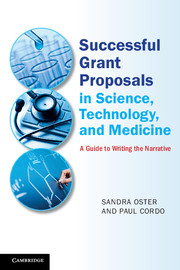Book contents
- Frontmatter
- Dedication
- Contents
- Preface and Acknowledgments
- 1 The Scientific Grant Proposal and Its Narrative
- 2 The Aims Section
- 3 The Background Section
- 4 The Preliminary Studies/Progress Report Section
- 5 The Methods Section, Part 1
- 6 The Methods Section, Part 2
- 7 Other prose considerations
- 8 Technical features of sentences
- Glossary
- Index
- References
8 - Technical features of sentences
Published online by Cambridge University Press: 05 September 2015
- Frontmatter
- Dedication
- Contents
- Preface and Acknowledgments
- 1 The Scientific Grant Proposal and Its Narrative
- 2 The Aims Section
- 3 The Background Section
- 4 The Preliminary Studies/Progress Report Section
- 5 The Methods Section, Part 1
- 6 The Methods Section, Part 2
- 7 Other prose considerations
- 8 Technical features of sentences
- Glossary
- Index
- References
Summary
This chapter addresses technical issues with sentences that PIs typically encounter when drafting the narrative of a grant proposal. These issues involve citations, definitions, active grammar and passive grammar, and guidelines for shortening the text while keeping content changes to a minimum.
Citations
A citation is a reference that identifies the source of information, whether that source is from a journal, a book, the internet, a committee, or a person. Citations are important in academic documents in general, and they are particularly important in narratives to scientific grant proposals. Citations can enhance your credibility by demonstrating to reviewers the quality, breadth, and depth of your understanding of published research that relates to your research topic.
Some writers include citations while drafting the narrative, others begin including citations when they are close to the final draft, and others are somewhere in between: early in the drafting process, they fill in citations that they readily know and leave the others to later stages of drafting. If you do not include citations in early drafts of your grant proposal, you should at least include placeholders for them. Citation placeholders are symbols, such as XX, that do not ordinarily show up in a search of text and that you insert into the text while drafting to remind you where you need citations.
- Type
- Chapter
- Information
- Successful Grant Proposals in Science, Technology, and MedicineA Guide to Writing the Narrative, pp. 282 - 350Publisher: Cambridge University PressPrint publication year: 2015



